Author Archive
Wednesday, August 1st, 2012
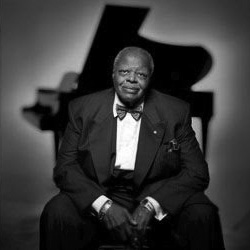 Oscar Peterson was born August 15, 1925 in Montreal, Quebec, Canada. His parents were immigrants from the British West Indies and Virgin Islands. His father, Daniel Peterson, was boatswain on a merchant ship when he met Olivia John in Montreal, where she worked as a cook and housekeeper for an English family. Daniel gave up the sailing work and began working as a porter for the Canadian Pacific Railway. He and Olivia married and stayed in Montreal as their family grew. Oscar Peterson was born August 15, 1925 in Montreal, Quebec, Canada. His parents were immigrants from the British West Indies and Virgin Islands. His father, Daniel Peterson, was boatswain on a merchant ship when he met Olivia John in Montreal, where she worked as a cook and housekeeper for an English family. Daniel gave up the sailing work and began working as a porter for the Canadian Pacific Railway. He and Olivia married and stayed in Montreal as their family grew.
Oscar was the fourth of five children. Their father insisted that they all learn a musical instrument, and Oscar began to study the trumpet. A childhood bout of tuberculosis forced a fortuitous switch to the piano, under the tutelage of his father and his older sister, Daisy. It soon became apparent that Oscar’s talent surpassed the capabilities of home teaching, and he was sent first to teacher Lou Hooper and then to the gifted Hungarian classical pianist, Paul deMarky. A warm and respectful musical friendship developed between the two, and with Mr. deMarky’s guidance Oscar’s mastery of the instrument grew, along with his dedication to and command of his talent.
The performance career of Oscar Peterson began while he was still a young teenager in high school, as pianist with the Johnny Holmes Orchestra in Montreal. After a few years with the Orchestra, he formed his own trio, the first in a format he maintained throughout his lifelong career. With the trio, he quickly gained fame and popularity throughout Canada. His appearances at the Alberta Lounge in Montreal were broadcast live on the radio. In 1949 impresario Norman Granz heard one of those broadcasts, went to the Alberta Lounge and enticed Mr. Peterson into making a surprise guest appearance with Granz’ all-star “Jazz at the Philharmonic” at Carnegie Hall later that year. Leaving the audience awestruck, Oscar joined JATP in 1950 as a full-time touring member. He formed a piano-bass duo with Ray Brown as well, and began recording for Granz at the same time. He also added Barney Kessel as the first of the guitarists with whom he would create trios, returning to the group format he loved.
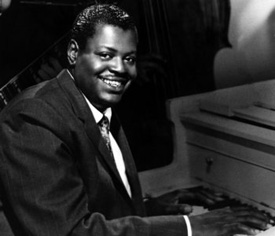
He was voted Jazz Pianist of the Year in 1950 by the Downbeat Readers’ Poll, a title he garnered for an additional twelve years. He toured the globe extensively with Jazz at the Philharmonic as well as with his own trio.
During the busy touring years in the early 1960s he founded a jazz school in Toronto called the Advanced School of Contemporary Music. This attracted students from all over the world. For a few months each year he and his trio, along with Phil Nimmons, a clarinetist from Toronto, would conduct classes at the school. The demands of his touring schedule forced closure of the school after a few years, but students still fondly recall their experiences there.
Oscar Peterson began composing while still a member of the Johnny Holmes Orchestra, and as time progressed he devoted more and more time to composition, while still maintaining a vigorous performance schedule. His “Hymn To Freedom” became one of the crusade songs of the Civil Rights Movement led by Dr. Martin Luther King, Jr. in the United States. It is still performed frequently by choirs worldwide. He also composed a salute to his beloved Canada, “The Canadiana Suite,” in the early 1960s. He has composed music for motion pictures, including the Canadian film “Big North,” made for Ontario Place in Toronto, and the feature film “The Silent Partner,” for which he won the Genie Award (Canadian Oscar award) for best original film score in 1978. He composed work for the National Film Board of Canada. His collaboration with filmmaker Norman McLaren on the film “Begone Dull Care” won awards all over the world. He composed the soundtrack for the film “Fields of Endless Day,” about U.S. slaves using the Underground Railroad to escape to Canada. Other compositional projects include a jazz ballet, a suite called “Africa,” and the Easter Suite, commissioned by the BBC in London and broadcast live on Good Friday in 1984, with annual broadcasts after that. “A Salute to Bach” for the composer’s 300th birthday, premiered with trio and orchestra at Toronto’s Roy Thomson Hall in 1985. He composed a suite for the Olympic Arts Festival of the Calgary Winter Olympics in 1988, and music for the opening ceremony of the Skydome in Toronto. In addition, Oscar Peterson composed more than 400 other pieces, many of which he performed and others continue to perform. Some of these compositions remain unpublished, but hopefully they will be published for future generations to hear.
Oscar Peterson has an extensive discography of his trio and quartet recordings, as well as his recordings with many of the other jazz greats. His varied albums include recordings with Ella Fitzgerald, Count Basie, Louis Armstrong, Duke Ellington, Dizzy Gillespie, Roy Eldridge, Ben Webster, Coleman Hawkins and Joe Pass. His worldwide performances and his recordings, particularly those with his trios and quartets, brought him recognition from numerous places all around the world.
Mr. Peterson also made many television appearances during his lifetime. He hosted five different talk show series, and Oscar’s widespread appeal led to his interviewing a variety of guests. The unusual range of personalities to appear on these programs included the former Prime Minister of England, the Rt. Hon. Sir Edward Heath, Twiggy, Anthony Burgess as well as many musicians. He also appeared in television commercials “Tears Are Not Enough,” a musical fundraiser for African famine relief.
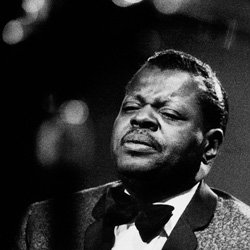 Preferring not to use his celebrity status to sway public opinions, Mr. Peterson nevertheless remained dedicated to the belief that his native Canada has a responsibility in leading the world in equality and justice. With this in mind, he took a firm stand to promote the cause of human rights fair treatment for Canada’s multicultural community. In recognition of this effort, Mr. Peterson was promoted to Companion of the Order of Canada, Canada’s highest civilian honor. He had been inducted as an Officer of the Order in 1972. Preferring not to use his celebrity status to sway public opinions, Mr. Peterson nevertheless remained dedicated to the belief that his native Canada has a responsibility in leading the world in equality and justice. With this in mind, he took a firm stand to promote the cause of human rights fair treatment for Canada’s multicultural community. In recognition of this effort, Mr. Peterson was promoted to Companion of the Order of Canada, Canada’s highest civilian honor. He had been inducted as an Officer of the Order in 1972.
During his life and career Mr. Peterson received many awards and honors. These include the Praemium Imperiale (the Arts equivalent of the Nobel Prize, presented by the Japan Art Association), the UNESCO International Music Prize, 8 Grammy Awards (including a Lifetime Achievement Grammy), the 1993 Glenn Gould Prize, of which he was the third recipient, the first chosen by unanimous decision and the first ever non-classical musician, and many honorary degrees.
Despite a stroke in 1993 that debilitated his left hand, Oscar Peterson was determined to continue performing, recording and composing. Within a year he had recovered and resumed his worldwide concert appearance schedule.
Oscar Peterson lived in the quiet city of Mississauga, Ontario, Canada. His hobbies included fishing, photography and astronomy. He was an avid audiophile and synthesist, as music was not only his profession but also his hobby. His home contained his own private recording studio, allowing him to work and still enjoy his family life. His passion for life, love and music remained strong for his entire life, and he continued to perform until shortly before his death. Oscar Peterson passed away at his home on the morning of December 23, 2007. His legacy lives on through his music.
Posted in Artist of the Month | 2 Comments »
Monday, July 30th, 2012
 Listen to WNCU via your mobile device by using Listen to WNCU via your mobile device by using Public Radio Player for iPhone or TuneIn Radio for iPhone, iPad, Android, Windows Phone, BlackBerry, Palm and Samsung Bada. Public Radio Player for iPhone or TuneIn Radio for iPhone, iPad, Android, Windows Phone, BlackBerry, Palm and Samsung Bada.
Posted in Music News | 3 Comments »
Saturday, July 7th, 2012
 A study by researchers at North Carolina Central University and Duke University offers new evidence supporting indoor insecticide spraying as a way to sharply reduce malaria deaths. In the most comprehensive review to date of the effectiveness of indoor insecticide treatments, a team led by Dohyeong Kim, Ph.D., associate professor in NCCU’s Department of Public Administration, found that over the last decade, the treatments have reduced infections in communities with high rates of malaria by an average of 62 percent, despite rising insecticide resistance among mosquitoes. A study by researchers at North Carolina Central University and Duke University offers new evidence supporting indoor insecticide spraying as a way to sharply reduce malaria deaths. In the most comprehensive review to date of the effectiveness of indoor insecticide treatments, a team led by Dohyeong Kim, Ph.D., associate professor in NCCU’s Department of Public Administration, found that over the last decade, the treatments have reduced infections in communities with high rates of malaria by an average of 62 percent, despite rising insecticide resistance among mosquitoes.
The investigators say the more important contribution of the study is its identification of factors — one of which is the use of the widely banned insecticide DDT — that appear to influence the success of indoor residual spraying (IRS). Their review appears in the July issue of The American Journal of Tropical Medicine and Hygiene.
Kim and his Duke co-authors, Kristen Fedak and Randall Kramer, conducted a meta-analysis — a form of research that synthesizes the results from previous studies — of 13 peer-reviewed reports published between 2000 and 2010 that considered how IRS affects malaria transmission in various settings, mostly in Africa. IRS involves coating the walls of homes or community buildings with insecticides in an effort to curb infections by killing malaria-carrying mosquitoes.
“Our findings show that during the last decade IRS has remained a powerful tool for fighting malaria, eventhough mosquitoes, particularly in Africa, are developing the ability to evade widely used insecticides,” Kim said.
It is widely accepted that IRS can significantly reduce malaria infections, Kim said, but what is less known are the factors that can influence the extent of success. The researchers found that IRS appears to be best at reducing malaria infections in areas experiencing a high rate of disease and where there is a threat from both Plasmodium falciparum parasites — the most deadly form of the disease — and Plasmodium vivax parasites.
The IRS campaigns were found to be more effective if they involved several rounds of spraying. Another factor that appeared to improve IRS effectiveness was the use of DDT. “Our (study) results show that DDT is more effective at reducing malaria prevalence thanpyrethroids or other insecticides,” the authors state. Pyrethroids are the most widely used class of insecticides in IRS programs. But over the last decademosquito populations in many malaria-endemic areas have developed traits that make them resistant to these compounds.
DDT (dichlorodiphenyltrichloroethane) has been banned in the United States since 1972 and subsequently in many other countries over concerns about its toxicity to humans and animals. Those dangers were primarily the result of widespread use of DDT in agricultural settings, however, and applications for IRS are small by comparison. Kim and his colleagues note that recent studies indicate that even at low levels, DDT may still be harmful to those exposed. But he said the study’s findings indicate that the advantages may outweigh the hazards in places where malaria transmission is particularly intense. The environmental dangers would need to be weighed against DDT’s potential to reduce malaria illnesses and deaths, he said.
Kim and his colleagues note that the finding of substantial effectiveness (62 percent with considerablevariation) for indoor spraying implies that mosquito control methods have “improved substantially during the past decade.” They also called for more studies that consider the effectiveness of IRS and insecticide-treated bed nets together to see whether “there is any additional benefit of combining” the two in the same households.
The review by Kim’s group is one of two major articles about the battle against malaria in the July issue of The American Journal of Tropical Medicine and Hygiene. In the other study, scientists affirmed the effectiveness of a critical anti-malarial drug, Artesunate, in a West African malaria “hot zone,” even though malaria-carrying parasites in Southeast Asia have developed resistance to the drug.
“Both of these studies demonstrate the incremental successes and long-term challenges faced by ourdrive to prevent needless deaths due to malaria,” said James W. Kazura, M.D., president of the American Society of Tropical Medicine and Hygiene, the organization that publishes the journal. “Make no mistake, this is a winnable battle. We can and will ultimately eradicate malaria from its strongholds in Africa and Asia.”
Dohyeong Kim joined the NCCU faculty in 2008, one year after receiving his doctorate in City and Regional Planning from UNC–Chapel Hill. A native of South Korea, he holds bachelor’s and master’s degrees in Public Administration from Yonsei University in Seoul.
The full article can beviewed here: http://www.ajtmh.org/content/87/1/117.full
(Note: Dr. Kim is currently in South Korea but can be reached for interviews. Interview inquiries should be directed to Bridget DeSimone at 301-280-5735 or bdesimone@burnesscommunications.com.)
Posted in Public Affairs | 6 Comments »
Sunday, July 1st, 2012
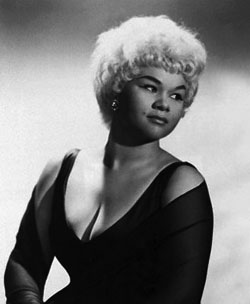 Born January 25, 1938, Etta James was a gospel prodigy. In 1954, she moved to Los Angeles to record The Wallflower. By 1960, her career began to soar. Despite her continued drug problems, she earned a Grammy nomination for her 1973 eponymous album. In 2006, she released the album All the Way. She is considered one of the most dynamic singers in music. Born January 25, 1938, Etta James was a gospel prodigy. In 1954, she moved to Los Angeles to record The Wallflower. By 1960, her career began to soar. Despite her continued drug problems, she earned a Grammy nomination for her 1973 eponymous album. In 2006, she released the album All the Way. She is considered one of the most dynamic singers in music.
My mother always told me, even if a song has been done a thousand times, you can still bring something of your own to it. I’d like to think I did that. – Etta James
Early Life
Born Jamesetta Hawkins on January 25, 1938, in Los Angeles. As a child, Etta was a gospel prodigy, singing in her church choir and on the radio at the age of 5. When she turned 12, she moved north to San Francisco where she formed a trio and was soon working for bandleaderJohnny Otis.
In 1954, she moved to Los Angeles to record “The Wallflower” (a tamer title for the then-risqué “Roll with Me Henry”) with the Otis band. It was that year that the young singer became Etta James (an shortened version of her first name) and her vocal group was dubbed The Peaches (also Etta’s nickname). Soon after, James launched her solo career with such hits as “Good Rockin’ Daddy” in 1955.
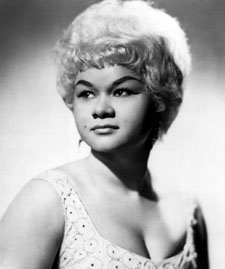 Mid-career Mid-career
After signing with Chicago’s Chess Records in 1960, James’ career began to soar. Chart toppers included duets with then-boyfriend Harvey Fuqua, the heart-breaking ballad “All I Could Do Was Cry,” “At Last” and “Trust in Me.” But James’ talents weren’t reserved for powerful ballads. She knew how to rock a house, and did so with such gospel-charged tunes as “Something’s Got a Hold On Me” in 1962 and “In The Basement” in 1966. James continued to work with Chess throughout the 1960s and early 1970s. Sadly, heroin addiction affected both her personal and professional life, but despite her continued drug problems she persisted in making new albums. In 1967, James recorded with the Muscle Shoals house band in the Fame studios, and the collaboration resulted in the triumphant Tell Mama album.
James’ work gained positive attention from critics as well as fans, and her 1973 album Etta James earned a Grammy nomination, in part for its creative combination of rock and funk sounds. After completing her contract with Chess in 1977, James signed on with Warner Brothers Records. A renewed public profile followed her appearance at the opening ceremony of the Los Angeles Olympics in 1984. Subsequent albums, including Deep In The Night and Seven Year Itch, received high critical acclaim. She was inducted into the Rock And Roll Hall Of Fame in 1993, prior to her signing a new recording contract with Private Records.
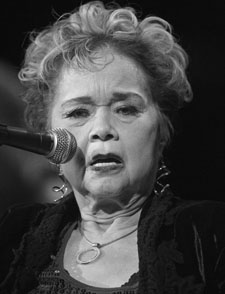 Later Career Later Career
With suggestive stage antics and a sassy attitude, James continued to perform and record well into the 1990s. Always soulful, her extraordinary voice was showcased to great effect on her recent private releases, including Blue Gardenia, which rose to the top of the Billboard jazz chart. In 2003, James underwent gastric bypass surgery and lost over 200 pounds. The dramatic weight loss had an impact on her voice, as she told Ebony magazine that year. “I can sing lower, higher and louder,” James explained.
That same year, Etta James released Let’s Roll, which won the Grammy Award for Best Contemporary Blues Album. Her sons, Donto and Sametto James, served as producers on the recording, along with Josh Sklair. This team regrouped for her next effort,Blues to the Bone (2004), which brought James her third Grammy Award—this time in the Best Traditional Blues Album category. In 2006, James released the album All the Way, which featured cover versions of songs by Prince, Marvin Gaye and James Brown. She participated in a tribute album the following year for jazz great Ella Fitzgerald, called We Love Ella.
Controversy with Beyoncé
The story of the early days of Chess Records was brought to the big screen as Cadillac Records in 2008, with singer Beyoncè Knowles playing Etta James in the film. Beyoncè also recorded her own version of James’ signature song, “At Last” for the soundtrack.
While James publicly supported the film, she was reportedly miffed when Beyoncè sang the song at President Barack Obama‘s inaugural ball in January 2009. James allegedly told concert-goers in Seattle in February that Beyoncè “had no business … singing my song that I been singing forever.” Despite some media attention over her comments, James was unfazed by the incident, and pressed on with her busy performing schedule.
Recent Years
As she entered her seventies, Etta James began struggling with health issues. James was hospitalized in 2010 for a blood infection, along with other ailments. It was later revealed that the legendary singer suffered from dementia, and was receiving treatment for leukemia. Her medical problems came to light in court papers filed by her husband, Artis Mills. Mills sought to gain control over $1 million of James’ money, but he was challenged by James’ two sons, Donto and Sametto. The two parties later worked out an agreement.
James released her latest studio album, The Dreamer, in November 2011, which received warm reviews. A few weeks later, James’ doctor announced that the singer was terminally ill. “She’s in the final stages of leukemia. She has also been diagnosed with dementia and Hepatitis C,” Dr. Elaine James (not related to the singer) told a local newspaper. James’ sons also acknowledged that Etta’s health was declining and was receiving care at her Riverside, California, home. She passed away on January 20, 2012.
Posted in Artist of the Month | 7 Comments »
Saturday, June 30th, 2012

Dr. Igor V. Bondarev, associate professor of physics at North Carolina Central University, and two other scientists have been awarded a patent for a device to scan extremely smooth surfaces to identify the tiniest flaws. The device, called a carbon nanotube oscillator, has a wide range of potential applications in industrial, research and university laboratories and in manufacturing.
“When you need an extremely clean, flat solid surface, you can never get it, even if you polish,” Bondarev says. “Our device is able to sense surface roughness with a resolution that is two to three orders of magnitude better than that of currently available atomic force microscopes. That will make it possible to sort out ‘dirty’ sample surfaces from ‘clean’ ones.”
The new machine does not yet physically exist, Bondarev emphasizes. “The patent is for the concept,” he says. But there is good reason to think the oscillator has the potential to improve significantly on the performance of atomic force microscopes now in use. Many thousands of such microscopes are employed in laboratory and industrial settings around the world, and they range in price from $20,000 to more than $1 million.
Sharing in the patent with Bondarev are his long-term collaborators, University of South Florida (USF) physicists Adrian Popescu and Lilia Woods. The three scientists are named as the inventors, and the patent is assigned to their respective universities.
Carbon nanotubes are tiny long hollow structures, their walls formed by one-atom-thick sheets of carbon called graphene. They are among the stiffest and strongest fibers known, with remarkable electronic properties, and they have attracted huge academic and industrial interest.
In atomic force microscopes, a tiny, needle-like piece of metal functions as a mechanical probe, “feeling” a surface to detect flaws. The device developed by Bondarev and his USF collaborators replaces the metal piece with a double-walled carbon nanotube oscillator in which one cylindrical nanotube is contained and moves within another one of slightly larger diameter. The device will be able to measure a given surface profile at a resolution on the order of one nanometer — one billionth of a meter. A single molecule of water has a size of slightly less than one nanometer; a human hair is about 100,000 nanometers thick.
Any commercial payoff from the patent is likely to be years away. Dr. Undi Hoffler, NCCU’s director of research compliance, said NCCU and USF expect to explore options for licensing the concept to a manufacturer. “This is a long-term prospect,” Hoffler said, “but this invention should stand for awhile.”
Bondarev joined the NCCU faculty in 2005. A native of Belarus, the former Soviet republic, he holds a master’s degree and Ph.D. from the Belarusian State University in Minsk, and a Doctor of Science (D.Sc.) degree in theoretical solid-state physics from the National Academy of Sciences of the Republic of Belarus.
Bondarev said he’ll be pleased to see the machine he helped conceive become reality. “I’m a theoretical physicist. I’ve done my part of the job,” he said. “The experimentalists now need to build it and use it.”
Posted in Public Affairs | 6 Comments »
Saturday, June 30th, 2012
 North Carolina Central University will welcome a new dean of the School of Law, Phyliss Craig-Taylor, in July. Craig-Taylor most recently served as associate dean for academics at Charlotte School of Law in Charlotte. Assuming the dean’s office marks a return to NCCU for Craig-Taylor, who served as a law professor from 2000 to 2006. North Carolina Central University will welcome a new dean of the School of Law, Phyliss Craig-Taylor, in July. Craig-Taylor most recently served as associate dean for academics at Charlotte School of Law in Charlotte. Assuming the dean’s office marks a return to NCCU for Craig-Taylor, who served as a law professor from 2000 to 2006.
Craig-Taylor has more than 22 years of experience in legal education and administration. She has been an active faculty member at the University of Florida College of Law, a visiting professor at the University of San Francisco School of Law and a professor in residence at the University of Warsaw College of Law in Poland. Her areas of teaching include property, real estate finance, advanced issues in poverty, land use, land loss, women and the law, and professional responsibility.
“The appointment of Craig-Taylor signifies a continuation of the school’s mission to create a challenging educational program that will produce competent and responsible members of the legal profession,” NCCU Chancellor Charlie Nelms said.
A certified green belt in Six Sigma process management, Craig-Taylor was responsible for the establishment of a bar preparation program that increased the bar passage rate for targeted groups from 30 percent to 100 percent. A support program focused on study skills, reading comprehension, time management and examination preparation were also established under her leadership.
As an executive in residence at the Central Administration office in Naples, Fla., Craig-Taylor provided leadership and oversight to academic affairs and academic outcomes teams for the Charlotte School of Law, Phoenix School of Law and Florida Coastal School of Law.
Through her involvement with the American Bar Association, Craig-Taylor has held several leadership positions in the Section of Litigation, including serving as a division director. She has served on the N.C. State Bar Ethics Committee and the N.C. Bar Association Minorities in the Profession Committee.
“The law school has long been noted for its focus on public service and on meeting the needs of people and communities that are underserved by the legal profession,” said NCCU Provost and Vice Chancellor of Academic Affairs Debbie Thomas. “We are confident that Dean Craig-Taylor will continue this commitment.”
 Craig-Taylor has published numerous articles on land loss in the African-American community and discrimination in the application of laws for minority groups, including women. She is currently writing a book, “Open Door Days on the Last Plantation: An Analysis of Property Loss, Race and Citizenship.” Craig-Taylor has published numerous articles on land loss in the African-American community and discrimination in the application of laws for minority groups, including women. She is currently writing a book, “Open Door Days on the Last Plantation: An Analysis of Property Loss, Race and Citizenship.”
A graduate of the University of Alabama Tuscaloosa, where she completed both her undergraduate degree and law degree, she later served as a partner in the law firm of England & Bivens and as a judicial clerk for the Alabama Supreme Court. She later earned a Master of Laws degree at Columbia University.
She succeeds Raymond C. Pierce, who has been dean of the School of Law since 2005 and is returning to private practice.
Opening its doors in 1940, the NCCU School of Law has been recognized as a “best-value” law school by preLaw magazine, a National Jurist publication, in rankings based on affordability, bar passage rates and job placement. Last year, its award-winning clinical program was ranked fourth in the nation. The Elder Law Project, working with seniors in North Carolina, received the 2012 North Carolina Bar Association’s Pro Bono Service Award. Among the nation’s most diverse law schools, the school received Association of American Law Schools (AALS) membership in January 2012, and was only the third law school at a historically black university to join the association.
Posted in Public Affairs | 8 Comments »
Saturday, June 30th, 2012

North Carolina Central University’s Julius L. Chambers Biomedical/Biotechnology Research Institute (BBRI) has received a National Institute of Minority Health and Health Disparities (NIMHD) Exploratory Center of Excellence grant for $5.7 million. Originally funded in 2002 as Project EXPORT, this is a five-year competitive renewal of the longest-funded National Institutes of Health (NIH) grant at BBRI.
Research involving health disparities — the gaps between the health status of racial and ethnic minorities compared with the population as a whole — is explicitly part of BBRI’s mission, and the projects funded by the NIH grant all focus on cardio-metabolic diseases that disproportionately affect African-Americans.
The projects will be administered by the newly named Center for Translational Health Equality Research (CTHER), led by K. Sean Kimbro, Ph.D., director of BBRI, and Mildred A. Pointer, Ph.D., FAHA, associate professor. CTHER consists of four key projects:
Adiponectin in Cardio-metabolic Health Disparities: Sujoy Ghosh, Ph.D., senior scientist, will lead an investigation of the role of adiponectin, a substance that helps the body regulate insulin, in health disparities. Low levels of adiponectin are associated with diabetes and obesity.
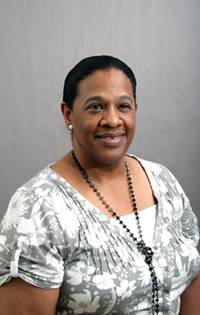
Calcium in Metabolic Syndrome: Emmanuel Awumey, Ph.D., assistant professor and research scientist, and Mildred Pointer, Ph.D., FAHA, both in the Cardio-Metabolic Research Program at BBRI, will lead an investigation of the role of calcium in diabetes, hypertension and obesity. This project will combine laboratory and community approaches, conducted by the Community Engagement group, to gain a better understanding of the role of calcium in these diseases.
Training and Education: Saundra Delauder, Ph.D., associate professor of chemistry, will direct a project to support minority students in health disparities research. The aims are to recruit and increase the number of future health disparities researchers from the fields of biomedical sciences, nursing, psychology, and public health education.
Community Engagement: Natasha Greene Leathers, Ph.D., RN, FNP, BC, assistant professor of nursing, will oversee community-based culturally sensitive interventions aimed at helping African-American communities in Halifax County, N.C., and surrounding counties to adopt healthy behaviors. This project will develop a partnership between a rural population and academic researchers to evaluate and refine a family-focused intervention for African-Americans with Type 2 Diabetes.
“For the renewal of this grant, we targeted diseases that profoundly impact minority communities,” BBRI director Kimbro said. “With an investment of approximately $5 million over five years, the National Institutes of Health and the scientific community have given a strong statement of support and confidence in our research.”
 Pointer emphasized the translational aspect of the projects — finding ways to use the research to directly improve health outcomes. “We really wanted to combine expertise from the various disciplines to make sure that our research conclusions can be directly applied in North Carolina communities,” she said. “This ‘bench-to-curbside’ philosophy is at the heart of CTHER.” Pointer emphasized the translational aspect of the projects — finding ways to use the research to directly improve health outcomes. “We really wanted to combine expertise from the various disciplines to make sure that our research conclusions can be directly applied in North Carolina communities,” she said. “This ‘bench-to-curbside’ philosophy is at the heart of CTHER.”
CTHER will partner with organizations and communities to conduct these four projects, working toward an ultimate goal of eliminating cardio-metabolic health disparities. BBRI is part of NCCU’s Division of Research and Economic Development.
Posted in Public Affairs | 4 Comments »
Monday, May 14th, 2012
North Carolina Central University awarded bachelor’s degrees to 536 students on Saturday, May 12, in commencement ceremonies at O’Kelly–Riddick Stadium.
 But before the graduates walked across the stage to collect their diplomas, they were rousingly challenged by the Rev. William Barber II to engage in the never-ending fight for social justice. Barber, a 1985 graduate of NCCU and the president of the North Carolina State Conference of the NAACP, brought the crowd to its feet with an address that recalled the messages and the cadences of the Rev. Martin Luther King Jr. But before the graduates walked across the stage to collect their diplomas, they were rousingly challenged by the Rev. William Barber II to engage in the never-ending fight for social justice. Barber, a 1985 graduate of NCCU and the president of the North Carolina State Conference of the NAACP, brought the crowd to its feet with an address that recalled the messages and the cadences of the Rev. Martin Luther King Jr.
“You live at a turning point in history,” Barber said. “These are tough times, troubling times. We see mean and oppressive politics taking us in the wrong direction. Why are you here? Because there’s a God who has to raise a counterforce to injustice.”
Barber noted that he had recently concluded a statewide “Putting a Face on Poverty Tour,” drawing attention to the continuing reality that 1.6 million state residents — including 600,000 children — live below the poverty line. “We found human beings living under bridges and in the woods,” he said. “We have seen poverty that makes you sick and ashamed.
“The soul of our nation is on trial,” Barber said. “If our values are right and our budgets are just, we can build a better society. We can put the poor at the center of our public policy agenda. We can reject hate and division. We can finish the job of being, in word and deed, one nation under God with liberty and justice for all.”
NCCU Chancellor Charlie Nelms presented Barber with an honorary Doctor of Humane Letters degree and citation “in recognition of his tireless service to society as a warrior for justice and social change and a speaker of truth to power.”
As has become his custom at commencement ceremonies, Nelms publicly recognized a few of the graduates for their accomplishments and their success in overcoming obstacles.
He praised LaSaundra Maynor, who graduated cum laude with a Bachelor of Science degree in Public Health Education. A mother of three, she was encouraging her eldest daughter to plan for college when her daughter urged her to do the same. So Maynor enrolled at NCCU, taking her classes and completing internships while continuing to work five 12-hour shifts a week as a nursing staff specialist at Durham Regional Hospital.
 He also praised Alejandro Espitia as “an exemplar of the phrase student-athlete.” Espitia, a native of Bogota, Colombia, graduated summa cum laude with a Bachelor of Arts degree in political science. He was captain of the NCCU tennis team and also performed many hours of community service as a tennis teacher to poor children and a volunteer at many events. He will enter law school at the University of Pennsylvania in the fall. He also praised Alejandro Espitia as “an exemplar of the phrase student-athlete.” Espitia, a native of Bogota, Colombia, graduated summa cum laude with a Bachelor of Arts degree in political science. He was captain of the NCCU tennis team and also performed many hours of community service as a tennis teacher to poor children and a volunteer at many events. He will enter law school at the University of Pennsylvania in the fall.
Four faculty members were honored during the ceremony. Dr. Ira T. Wiggins, longtime director of NCCU’s renowned Jazz Studies program, received the UNC Board of Governors Award for Excellence in Teaching. NCCU awards for teaching excellence were presented to Dr. Prince Hycy Bull, associate professor and coordinator of educational technology at the School of Education; Dr. La Verne Reid, associate dean of the College of Behavioral and Social Science and professor of Public Health Education; and Dr. James Pearce, associate professor of English and director of the English Department’s graduate program.
Two longtime members of the NCCU Board of Trustees, Kay T. Thomas and R. Edward Stewart, were awarded the titles of trustees emeriti.
This was the second year in which NCCU conducted separate commencement exercises for graduate and professional students. In a ceremony Friday, the university awarded master’s and law degrees to 385 graduates. More information and photos from both ceremonies can viewed at the Commencement website, http://web.nccu.edu/commencement/
Posted in Public Affairs | 4 Comments »
Monday, May 14th, 2012
North Carolina Central University awarded graduate and professional degrees to 385 students on Friday, May 11, in ceremonies at McDougald–McLendon Gymnasium. In a rousing commencement address, attorney and talk-show host Warren Ballentine challenged the graduates to “stay humble and remember to dream.”
“You are the cream of the crop,” Ballentine told the graduates. “Many of you will go on to great things. But remember the journey is not yours alone. You stood on the shoulders of your family members and others who came before you. Always remember whence you came — and always humble yourself.”
Ballentine is the host of “The Warren Ballentine Show,” one of the top-rated syndicated talk shows in the nation. He encourages his listeners to harness injustice as a means of bringing about change and solving the problems of the black community.
He urged the graduates to look out for each other and to cultivate “geese sense.” Geese have the sense to fly in flocks, he noted. They are able to travel much faster with a single goose in front working hard, and yielding to another member of the flock when tired. “They have the sense to come together,” Ballentine said. “They have each other’s back.”
NCCU Chancellor Charlie Nelms joined Ballentine in congratulating the graduates and, as is his custom, he publicly recognized a few for their success in overcoming obstacles.
 Nelms praised Belinda Behncke Biney, who graduated magna cum laude with a Master of Business Administration degree. Behncke Biney grew up in Germany, the daughter of parents who had emigrated from Ghana, and was usually the only black person in her classes. She came to the United States to attend Virginia Commonwealth University on a volleyball scholarship, but soon transferred to NCCU to experience life as a member of the majority at a historically black university. She received an undergraduate degree in political science and starred on the volleyball team. She had a year of eligibility remaining on her athletics scholarship, so she continued as a student-athlete during her first year of graduate school — and was named student-athlete of the year for 2010-11. Nelms praised Belinda Behncke Biney, who graduated magna cum laude with a Master of Business Administration degree. Behncke Biney grew up in Germany, the daughter of parents who had emigrated from Ghana, and was usually the only black person in her classes. She came to the United States to attend Virginia Commonwealth University on a volleyball scholarship, but soon transferred to NCCU to experience life as a member of the majority at a historically black university. She received an undergraduate degree in political science and starred on the volleyball team. She had a year of eligibility remaining on her athletics scholarship, so she continued as a student-athlete during her first year of graduate school — and was named student-athlete of the year for 2010-11.
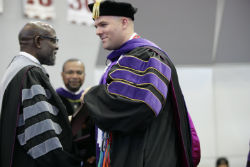 The chancellor also praised T. Greg Doucette, who received a Juris Doctor degree as a graduate of the NCCU School of Law. A onetime dropout from N.C. State University who was homeless for a time before returning to earn a degree at N.C. State, Doucette emerged as a student leader while a law student at NCCU. He served as president of both the UNC Association of Student Governments and the NCCU Student Bar Association The chancellor also praised T. Greg Doucette, who received a Juris Doctor degree as a graduate of the NCCU School of Law. A onetime dropout from N.C. State University who was homeless for a time before returning to earn a degree at N.C. State, Doucette emerged as a student leader while a law student at NCCU. He served as president of both the UNC Association of Student Governments and the NCCU Student Bar Association
Posted in Public Affairs | 4 Comments »
Monday, May 14th, 2012
Bass player and songwriter Donald “Duck’’ Dunn, a member of the Rock ‘n’ Roll Hall of Fame band Booker T. and the MGs and the Blues Brothers band, has died in Tokyo. He was 70.
Dunn was in Tokyo for a series of shows. News of his death was posted on the Facebook site of his friend and fellow musician Steve Cropper, who was on the same tour. Cropper said Dunn died in his sleep.
Miho Harasawa, a spokeswoman for Tokyo Blue Note, the last venue Dunn played, confirmed he died alone early Sunday. She had no further details.
Originally published on boston.com
Posted in Music News | 5 Comments »
|
 Oscar Peterson was born August 15, 1925 in Montreal, Quebec, Canada. His parents were immigrants from the British West Indies and Virgin Islands. His father, Daniel Peterson, was boatswain on a merchant ship when he met Olivia John in Montreal, where she worked as a cook and housekeeper for an English family. Daniel gave up the sailing work and began working as a porter for the Canadian Pacific Railway. He and Olivia married and stayed in Montreal as their family grew.
Oscar Peterson was born August 15, 1925 in Montreal, Quebec, Canada. His parents were immigrants from the British West Indies and Virgin Islands. His father, Daniel Peterson, was boatswain on a merchant ship when he met Olivia John in Montreal, where she worked as a cook and housekeeper for an English family. Daniel gave up the sailing work and began working as a porter for the Canadian Pacific Railway. He and Olivia married and stayed in Montreal as their family grew.
 Preferring not to use his celebrity status to sway public opinions, Mr. Peterson nevertheless remained dedicated to the belief that his native Canada has a responsibility in leading the world in equality and justice. With this in mind, he took a firm stand to promote the cause of human rights fair treatment for Canada’s multicultural community. In recognition of this effort, Mr. Peterson was promoted to Companion of the Order of Canada, Canada’s highest civilian honor. He had been inducted as an Officer of the Order in 1972.
Preferring not to use his celebrity status to sway public opinions, Mr. Peterson nevertheless remained dedicated to the belief that his native Canada has a responsibility in leading the world in equality and justice. With this in mind, he took a firm stand to promote the cause of human rights fair treatment for Canada’s multicultural community. In recognition of this effort, Mr. Peterson was promoted to Companion of the Order of Canada, Canada’s highest civilian honor. He had been inducted as an Officer of the Order in 1972.

 Listen to WNCU via your mobile device by using
Listen to WNCU via your mobile device by using Public Radio Player for iPhone or TuneIn Radio for iPhone, iPad, Android, Windows Phone, BlackBerry, Palm and Samsung Bada.
Public Radio Player for iPhone or TuneIn Radio for iPhone, iPad, Android, Windows Phone, BlackBerry, Palm and Samsung Bada. A study by researchers at North Carolina Central University and Duke University offers new evidence supporting indoor insecticide spraying as a way to sharply reduce malaria deaths. In the most comprehensive review to date of the effectiveness of indoor insecticide treatments, a team led by Dohyeong Kim, Ph.D., associate professor in NCCU’s Department of Public Administration, found that over the last decade, the treatments have reduced infections in communities with high rates of malaria by an average of 62 percent, despite rising insecticide resistance among mosquitoes.
A study by researchers at North Carolina Central University and Duke University offers new evidence supporting indoor insecticide spraying as a way to sharply reduce malaria deaths. In the most comprehensive review to date of the effectiveness of indoor insecticide treatments, a team led by Dohyeong Kim, Ph.D., associate professor in NCCU’s Department of Public Administration, found that over the last decade, the treatments have reduced infections in communities with high rates of malaria by an average of 62 percent, despite rising insecticide resistance among mosquitoes. Born January 25, 1938, Etta James was a gospel prodigy. In 1954, she moved to Los Angeles to record The Wallflower. By 1960, her career began to soar. Despite her continued drug problems, she earned a Grammy nomination for her 1973 eponymous album. In 2006, she released the album All the Way. She is considered one of the most dynamic singers in music.
Born January 25, 1938, Etta James was a gospel prodigy. In 1954, she moved to Los Angeles to record The Wallflower. By 1960, her career began to soar. Despite her continued drug problems, she earned a Grammy nomination for her 1973 eponymous album. In 2006, she released the album All the Way. She is considered one of the most dynamic singers in music. Mid-career
Mid-career Later Career
Later Career
 North Carolina Central University will welcome a new dean of the School of Law, Phyliss Craig-Taylor, in July. Craig-Taylor most recently served as associate dean for academics at Charlotte School of Law in Charlotte. Assuming the dean’s office marks a return to NCCU for Craig-Taylor, who served as a law professor from 2000 to 2006.
North Carolina Central University will welcome a new dean of the School of Law, Phyliss Craig-Taylor, in July. Craig-Taylor most recently served as associate dean for academics at Charlotte School of Law in Charlotte. Assuming the dean’s office marks a return to NCCU for Craig-Taylor, who served as a law professor from 2000 to 2006.

 Pointer emphasized the translational aspect of the projects — finding ways to use the research to directly improve health outcomes. “We really wanted to combine expertise from the various disciplines to make sure that our research conclusions can be directly applied in North Carolina communities,” she said. “This ‘bench-to-curbside’ philosophy is at the heart of CTHER.”
Pointer emphasized the translational aspect of the projects — finding ways to use the research to directly improve health outcomes. “We really wanted to combine expertise from the various disciplines to make sure that our research conclusions can be directly applied in North Carolina communities,” she said. “This ‘bench-to-curbside’ philosophy is at the heart of CTHER.” But before the graduates walked across the stage to collect their diplomas, they were rousingly challenged by the Rev. William Barber II to engage in the never-ending fight for social justice. Barber, a 1985 graduate of NCCU and the president of the North Carolina State Conference of the NAACP, brought the crowd to its feet with an address that recalled the messages and the cadences of the Rev. Martin Luther King Jr.
But before the graduates walked across the stage to collect their diplomas, they were rousingly challenged by the Rev. William Barber II to engage in the never-ending fight for social justice. Barber, a 1985 graduate of NCCU and the president of the North Carolina State Conference of the NAACP, brought the crowd to its feet with an address that recalled the messages and the cadences of the Rev. Martin Luther King Jr. He also praised Alejandro Espitia as “an exemplar of the phrase student-athlete.” Espitia, a native of Bogota, Colombia, graduated summa cum laude with a Bachelor of Arts degree in political science. He was captain of the NCCU tennis team and also performed many hours of community service as a tennis teacher to poor children and a volunteer at many events. He will enter law school at the University of Pennsylvania in the fall.
He also praised Alejandro Espitia as “an exemplar of the phrase student-athlete.” Espitia, a native of Bogota, Colombia, graduated summa cum laude with a Bachelor of Arts degree in political science. He was captain of the NCCU tennis team and also performed many hours of community service as a tennis teacher to poor children and a volunteer at many events. He will enter law school at the University of Pennsylvania in the fall. Nelms praised Belinda Behncke Biney, who graduated magna cum laude with a Master of Business Administration degree. Behncke Biney grew up in Germany, the daughter of parents who had emigrated from Ghana, and was usually the only black person in her classes. She came to the United States to attend Virginia Commonwealth University on a volleyball scholarship, but soon transferred to NCCU to experience life as a member of the majority at a historically black university. She received an undergraduate degree in political science and starred on the volleyball team. She had a year of eligibility remaining on her athletics scholarship, so she continued as a student-athlete during her first year of graduate school — and was named student-athlete of the year for 2010-11.
Nelms praised Belinda Behncke Biney, who graduated magna cum laude with a Master of Business Administration degree. Behncke Biney grew up in Germany, the daughter of parents who had emigrated from Ghana, and was usually the only black person in her classes. She came to the United States to attend Virginia Commonwealth University on a volleyball scholarship, but soon transferred to NCCU to experience life as a member of the majority at a historically black university. She received an undergraduate degree in political science and starred on the volleyball team. She had a year of eligibility remaining on her athletics scholarship, so she continued as a student-athlete during her first year of graduate school — and was named student-athlete of the year for 2010-11. The chancellor also praised T. Greg Doucette, who received a Juris Doctor degree as a graduate of the NCCU School of Law. A onetime dropout from N.C. State University who was homeless for a time before returning to earn a degree at N.C. State, Doucette emerged as a student leader while a law student at NCCU. He served as president of both the UNC Association of Student Governments and the NCCU Student Bar Association
The chancellor also praised T. Greg Doucette, who received a Juris Doctor degree as a graduate of the NCCU School of Law. A onetime dropout from N.C. State University who was homeless for a time before returning to earn a degree at N.C. State, Doucette emerged as a student leader while a law student at NCCU. He served as president of both the UNC Association of Student Governments and the NCCU Student Bar Association